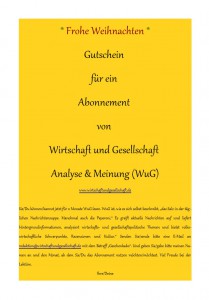In a lecture at Harvard Kennedy School in Cambridge (USA) yesterday the President of the European Central Bank (ECB) Mario Draghi said in the direction of “commentators on this side of the Atlantic (who) looked at the euro area and were convinced it would fail”:
“They mistook the euro for a fixed exchange rate regime, when in fact it is an irreversible single currency. And it is irreversible because it is born out of the commitment of European nations to closer integration – a commitment which, as the Nobel committee recognised last year, has roots in our desire for peace, security and transcending national differences.”
I hope Draghi is right, and I share his desire for peace, security and transcending national differences which indeed should be the driving force behind European integration. But did American commentators really mistake the euro for a fixed exchange rate regime, or is the core of the euro crisis rather similar to one of a fixed exchange rate regime? To put it more positively: Is the main challenge of the euro not the same as of a fixed exchange rate regime? Moreover, why should a single currency be irreversible? I agree so far with Draghi that it should be irreversible but I disagree with him that it is. Since we share the “roots” and the wish that the euro shall survive, it is worth to focus on the first question raised above: What is the core of the euro crisis – and perhaps of a fixed exchange rate regime, too? Fortunately, Draghi gives us a hint in his speech. He said:
“In a system of floating exchange rates, individual governments may be tempted to manipulate their currency to pursue ‘beggar thy neighbour’ policies, which constitutes a distortion of competition. An economy that increases productivity and competitiveness can be deprived of the benefits it should enjoy in terms of increased market share because of currency depreciation in competing countries.”
Then after having referred to Ragnar Nurkse and Robert Mundell which is not important to our discussion he said:
“In any case, the desire to limit exchange rate volatility in the EU was formulated very soon after the collapse of the Bretton Woods system in the early 1970s. It has been reflected in successive fixed exchange rate arrangements, such as the European Monetary System and its successor the Exchange Rate Mechanism.”
Finally, earlier in his speech Draghi, while pondering on differences between free trade areas and a single market, talked about “unfair or unlawful competition from abroad”.
That is enough stuff to suppose that Draghi get the euro wrong.
Firstly, all the students listened to Draghi yesterday in case they took Draghis speech seriously must believe that “individual governments tempted to manipulate their currency to pursue ‘beggar thy neighbour’ policies” can only do so in a system of floating exchange rates. Secondly, fixed exchange rate arrangements, such as the European Monetary System, worked smoothly – without any beggar thy neighbour policy. Thirdly, there is only unfair or unlawful competition from abroad but not from within.
To get all these mistakes right one only has to know that the core of an exchange regime with a certain range to a central rate (like the European Monetary System or the Exchange Rate Mechanism) or any other fixed exchange rate regime or a single currency is that every country involved has to stick to a common inflation target or inflation rate. The inflation target of the ECB for the euro area is less but close to two percent. Thus, if a countries´ inflation rate is below this inflation target it is depreciating in real terms, while a country with an inflation rate above that inflation target is appreciating in real terms. The first gains competitiveness, the latter looses competitiveness. Inflation is determined by productivity and wages. If wages increase/decrease to the same extent as productivity increases/decreases there will be no influence on production costs. Therefore, to meet the inflation target wages have to increase/decrease not only to the extent of the increase/decrease in productivity but to the extent of the inflation target, too. If productivity increases by one percent, wages should increase by three or 2.9 per cent to meet the inflation target of less but close to 2 percent.
Thus, if as Draghi put it in the case of a system of floating exchange rates “individual governments tempted to manipulate their currency to pursue ‘beggar thy neighbour’ policies” under a fixed exchange rate regime or a single currency they – aware or not aware of the consequences – only have to make proper laws that weaken the development of wages to that extent that they are not following any longer the increase in productivity and the inflation target. That was exactly the case in Germany since the beginning of the single currency especially after the introduction of the so called Agenda 2010 in 2003. From 2000 to 2008 the development of wages in Germany fell far below that of productivity and prices. In the period 2004 to 2007 after the introduction of the Agenda 2010 wage increases even didn´t meet productivity increases. As a consequence inflation fell far below the inflation target of the ECB in most of the years. Between 1999 to 2007 the inflation target was only met in 2005; and 2007 was the only year in that period when inflation was higher than the inflation target of the ECB. Under that circumstances Germany could “beggar their neighbours” in the single currency system. Thus there is not “only unfair or unlawful competition from abroad” as Draghi put it but also from within. No chance for other countries inside the euro area to escape by devaluation. Now those countries – some of them moved before in the opposite direction having higher inflation rates than target – are forced to “devalue” by wage cuts and other austerity measures bringing about unprecedented high unemployment rates and social misery and thereby threatening peace and security. Ironically Germany is pressuring most in that direction.
Different inflation rates were already responsible for the breakup of the European Monetary System in 1992, when Italy and the United Kingdom finally left the exchange rate regime and devalued their currencies according to their formerly accumulated differences in inflation. Different inflation rates were also responsible for the outbreak of the Asian crisis.
Draghi recognizes “financial fragmentation in the euro area” in his speech:
“The main reason is that the potential for financial fragmentation in the euro area was not recognised. Policy-makers and observers did not fully appreciate the extent to which diverging fundamentals between different economies could feed through to the banking system. This applies notably to sovereign debt, and the two-way interaction between sovereign distress and bank distress.”
However, Draghi misses the “diverging fundamentals between different economies” as far as the diverging inflation rates are concerned which are brought about by unfair, unlawful and irresponsible competition from within.
Dieser Text ist mir etwas wert
|
|




